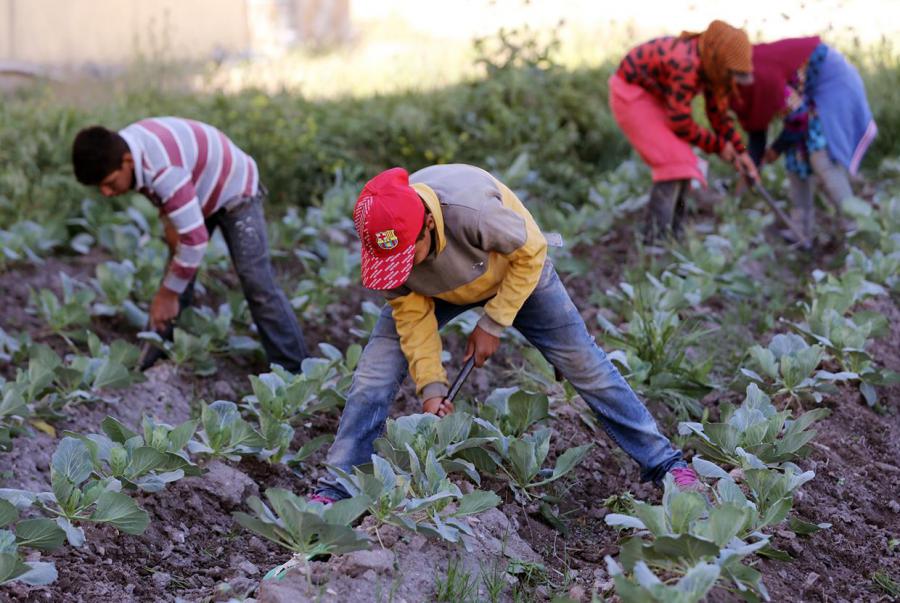
In the occasion of World Day against Child Labour, the Food and Agriculture Organization of the United Nations (FAO) organized on June 9th, a panel discussion on "Child Labour in Agriculture in Lebanon: Towards Comprehensive Support to the National Action Plan against Child Labour", at Crown Plaza Hotel in Hamra, Beirut. The panel discussion featured presentations and debates on the topic of Child labor in Agriculture and was composed of: Mrs. Nazha Shalita, Ministry of Labor (MoL), Mrs. Abir Abou alKhodoud, Ministry of Agriculture (MoA), Mrs.Rita Karam, Ministry of Social Affairs (MoSA) , Mrs. Sonia Khoury, Ministry of Education (MEHE), Cap. Bilal Rammal, General-Security, Mr. Carlos Bohorquez, UNICEF, Mrs. Hayat Osseyran, International Labor Organization (ILO), and Ms. Faten Adada, FAO.
In her opening remarks, Mrs. Solange Matta Saade, representing the FAO representative in Lebanon highlighted the theme of the occasion saying that "The focus of the 2016 World Day against Child Labour is on child labour and supply chains. With 168 million children still in child labour, all supply chains, from agriculture to manufacturing, services to construction, run the risk that child labour may be present," adding that "the FAO and the International Labour Organisation (ILO) are reaching out to agricultural professionals to raise awareness about the importance of child labour issues".
Social protection, and decent work policies for rural youth and adults, are the basic ingredients needed to end child labour in agriculture, according to Mrs. Faten Adada, Social Protection focal point at FAO Lebanon, "In the framework of supporting the livelihoods and improving the resilience of rural communities in Lebanon against crises, particularly the Syrian displaced crisis, FAO is intensifying efforts in order to ensure social protection through the implementation of programs designed to reduce poverty and strengthen labor markets".
The International Labor Organization's child labor consultant, Mrs. Hayat Osseiran, warned that "we must be extremely aware that the consecutive crises situations of war and displacement is taking us back in time when it comes to the implementation of Worst Forms of Child Labour Convention, 1999 (C182)", adding, "hazardous types of child labour is mainly seen amongst Syrian Refugees and urgent collective action is needed in this regards."
Mr. Carlos Bohorquez, Child Protection Specialist at UNICEF, stressed that attitudes and practices need to change in Lebanon, saying, "many young children are relied upon as bread winners in the household, andthe different stakeholders in the community must work together in changing the deeply rooted behavior and practices accepting child labour and in turn promote children to attend school - which should be the best place for children to 'work'."
"As poverty is the major cause of child labour, most of the school aged refugee children in Lebanon, especially in rural areas, are currently working in agriculture," stated Mrs. Sonia el Khoury, Head of the Project Management Unit, "We, as Ministry of Education and Higher Education (MEHE), are facing a major problem in retaining refugee students in public schools due to many agricultural seasons, leading students to miss schools for several days and eventually lead them to high risk of failure which is one of the main causes for drop out," she said.
In her presentation Mrs. Nazha Shalita, director of the Child Labor Unit at the MOL, focused on the role of the Lebanese Government in Eliminating Child Labour and child labour legal framework, emphasizing that there is an urgent need to raise public awareness of child labour and various immediate measures that can be undertaken to preserve the inalienable rights of all children in Lebanon. Mrs. Rita Karam representing the Ministry of Social Affairs also showcased the strategies and the role implemented by the Higher Council for Children to protect children from all kind of abuse.
Speaking on behalf of the Ministry of Agriculture, Mrs. Abou alKhoudoud said that the role of the ministry lies in raising awareness among the farmers and workers in the rural areas about the hazardous work that is damaging to the future wellbeing of their children; for instance, a child working in fields where pesticides have been applied etc …
On his part, Captain Bilal Rammal reiterated that the General-Security is keen to carry out all its duties and tasks as per the decree 8987 concerning the prohibition of employment of minors under the age of 18 in work that may harm their health, safety or morals.
The Lebanese Government represented by the Ministry of Labour and the National committee to combat child labour members is keen to recommend policies and plan actions that can be effective in protecting children from worst forms of child labour and consider agricultural and other projects that lead to minimal school dropout. Within the framework on integrating Social Protection into the agriculture sector, FAO in Lebanon and with the support of both Regional Initiatives on Small Scale Agriculture and Building Resilience for Food Security and Nutrition started its interventions on child labour in agriculture in 2015 in collaboration with Ministry of Agriculture and in partnership with ILO and UNICEF.
The International Labour Organization (ILO) launched the World Day Against Child Labour in 2002 to focus attention on the global extent of child labour and the action and efforts needed to eliminate it. Each year on 12thJune, the World Day brings together governments, employers and workers organizations, civil society, to highlight the plight of child labourers and what can be done to help them.
Source: NNA
 FR
FR EN
EN AR
AR








